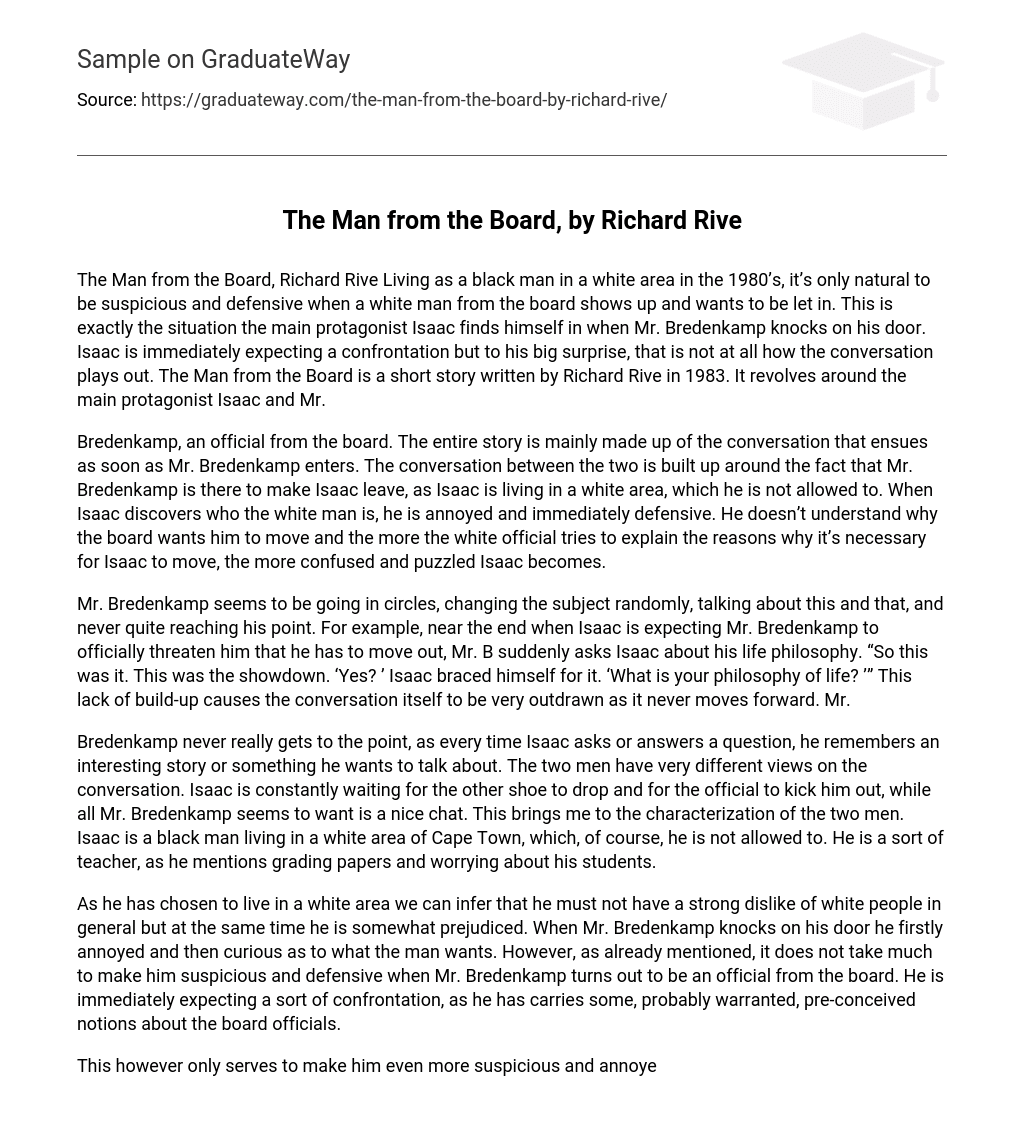The Man from the Board, Richard Rive Living as a black man in a white area in the 1980’s, it’s only natural to be suspicious and defensive when a white man from the board shows up and wants to be let in. This is exactly the situation the main protagonist Isaac finds himself in when Mr. Bredenkamp knocks on his door. Isaac is immediately expecting a confrontation but to his big surprise, that is not at all how the conversation plays out. The Man from the Board is a short story written by Richard Rive in 1983. It revolves around the main protagonist Isaac and Mr.
Bredenkamp, an official from the board. The entire story is mainly made up of the conversation that ensues as soon as Mr. Bredenkamp enters. The conversation between the two is built up around the fact that Mr. Bredenkamp is there to make Isaac leave, as Isaac is living in a white area, which he is not allowed to. When Isaac discovers who the white man is, he is annoyed and immediately defensive. He doesn’t understand why the board wants him to move and the more the white official tries to explain the reasons why it’s necessary for Isaac to move, the more confused and puzzled Isaac becomes.
Mr. Bredenkamp seems to be going in circles, changing the subject randomly, talking about this and that, and never quite reaching his point. For example, near the end when Isaac is expecting Mr. Bredenkamp to officially threaten him that he has to move out, Mr. B suddenly asks Isaac about his life philosophy. “So this was it. This was the showdown. ‘Yes? ’ Isaac braced himself for it. ‘What is your philosophy of life? ’” This lack of build-up causes the conversation itself to be very outdrawn as it never moves forward. Mr.
Bredenkamp never really gets to the point, as every time Isaac asks or answers a question, he remembers an interesting story or something he wants to talk about. The two men have very different views on the conversation. Isaac is constantly waiting for the other shoe to drop and for the official to kick him out, while all Mr. Bredenkamp seems to want is a nice chat. This brings me to the characterization of the two men. Isaac is a black man living in a white area of Cape Town, which, of course, he is not allowed to. He is a sort of teacher, as he mentions grading papers and worrying about his students.
As he has chosen to live in a white area we can infer that he must not have a strong dislike of white people in general but at the same time he is somewhat prejudiced. When Mr. Bredenkamp knocks on his door he firstly annoyed and then curious as to what the man wants. However, as already mentioned, it does not take much to make him suspicious and defensive when Mr. Bredenkamp turns out to be an official from the board. He is immediately expecting a sort of confrontation, as he has carries some, probably warranted, pre-conceived notions about the board officials.
This however only serves to make him even more suspicious and annoyed when the white man doesn’t act neither rude nor racist and he is convinced that Mr. Bredenkamp is messing with him as we see here: “Was Bredenkamp deliberately confusing him? Getting him off his guard? Softening him up? ” Mr. Bredenkamp is described in great detail in the beginning of the story. He is said to be a dumpy, middle-aged man wearing a khaki safari suit with khaki sock and a comb stuck in one against the calf. His actions show him as a jovial and good-natured man like which he remains through-out the conversation, despite Isaac’s efforts to throw him off.
He is confused by Isaac’s hostility and he doesn’t understand why Isaac can’t see the sense in having to move; it seems only rational for Isaac to live among his own people, which is what the board is helping him to do. This makes Mr. Bredenkamp seem quite naive which is only made clearer every time he misses the subtext in Isaac’s pokes: “’So you’ve decided to declare me coloured? ’(…) ‘Aren’t you? ’ Bredenkamp seemed genuinely puzzled at his attitude. ” It is very few times he seems affected by the remarks and he retains a good mood throughout the story, even as he says goodbye: “‘And thanks for the drink.
It was very nice of you. ’ He nudged Isaac playfully in the ribs. ” This clash of personalities brings me to the themes in the short story. I believe the main conflict in this text to be the clash of two life-views and the way prejudice only aggravates the issue. Mr. Bredenkamp is so set in his way of life that he is not even capable of seeing it from another angle; he never manages to see the point that Isaac is trying to make about the laws of settlement being wrong and discriminating. On the other hand, Isaac’s preconceived notions of the white man disables him from understanding that Mr.
Bredenkamp genuinely thinks that he is helping Isaac. He constantly thinks that he is being tricked which makes him act rude towards the official. In conclusion, the short story revolves around the meeting of two different ways of life and the misinterpretations that can happen when the people in question are either not open or even directly hostile towards each other. Of course the subject of the conversation between Mr. Bredenkamp is not a light-hearted one but the confusion and anxiety could have been diminished had Isaac only been more open-minded and Mr. Bredenkamp a bit more aware of the reality of the situation.





